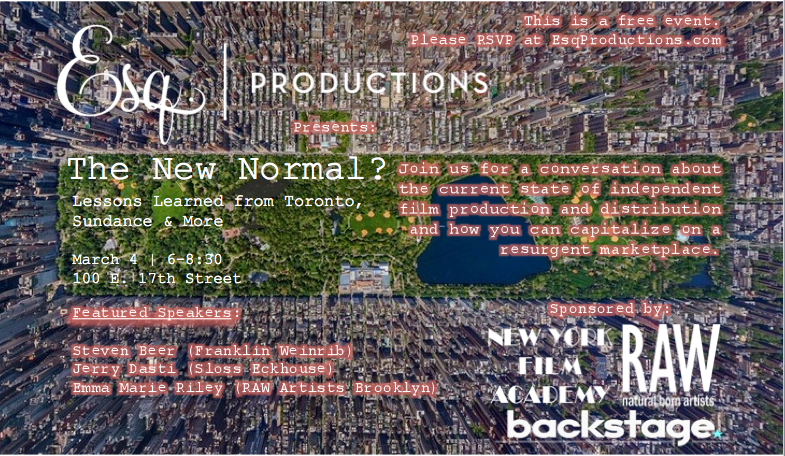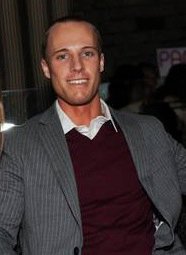
The New York Film Academy recently invited Esq. Productions to a discussion called “The New Normal? Lessons Learned from Toronto, Sundance & More.” The panel examined the current state of independent film production and distribution, the continuing evolution of multi-platforming, and provided students with practical tools they can use to capitalize on a resurgent indie film marketplace. The symposium, co-sponsored by RAW: Natural Born Artists and Backstage, featured guest speakers Steven Beer (Franklin, Weinrib, Rudell & Vassallo, PC), Jerry Dasti (Sloss Eckhouse Law Co), and Emma Marie Riley (Creative Director, RAW: Natural Born Artists Brooklyn).
Empowering creative artists. That is the mission at the heart of the 501(c)(3) non-profit Esq. Productions. Co-founded in 2010 by then-first year law student Latha Duncan, the company’s goal is simple: to provide creative artists across the various entertainment industries with the tools they need in order to successfully manage their careers from a commercial perspective while simultaneously protecting their artistic integrity.
Esq. Productions puts together educational programming that focuses specifically on the business and legal aspects of entertainment. Motivated by the realization that many indie filmmakers don’t have the benefit of exposure to business and legal counsel, Latha sought to fill the void. “Many filmmakers get caught in a Catch-22 situation,” Latha said. “Before you’ve made a name for yourself, it’s often difficult to secure representation, whether that means an agent or an attorney. But when faced with the spectre of truly independent film production, it can be just as difficult to make a name for yourself without the help of those business and legal counterparts. I wanted to break that cycle.”

The company, now run by Latha and his law school roommate, Brett Deacon, encourages artists to get involved in their own business affairs. “The reality is that there is a lot the artist can do him- or herself to secure their position,” said Latha. “A foundational understanding of relevant legal principles, knowing when and where to look out for red flags, and recognizing where you have leverage in different transactional settings can all go a long way. We’re not trying to turn artists into attorneys or to stifle creativity. But the nature of the marketplace is such that the days of a one-size-fits-all approach are long gone. Our goal is to get artists – whether filmmakers, fashion designers, musicians – to incorporate what they learn from our programming into a holistic approach to their careers.”
Before approaching the New York Film Academy, Esq. Productions has worked with the Art Center College of Design, the DePaul University School of Cinema & Interactive Media, and the USC School of Cinematic Arts. Always looking to provide attendees with the broadest perspective possible on the issues addressed, they brought together entertainment attorneys from Lionsgate, UTA, and Weintraub Tobin. “Entertainment attorneys play very different roles depending on where they work,” Latha said. “Bringing together people with different backgrounds and who represent different interests helps to hammer home that very point – that within the structure of any given deal, there are multiple competing interests at play. Politics can be just as important – and often is more important – than the black letter law.”
Having focused exclusively on the film industry to date, Latha and Brett are excited to be moving into both fashion and art in 2013. “We have a number of partnerships that we’re excited about,” said Brett. “Not only RAW Artists and Backstage, but also top law firms in LA and NYC. As the scope of the services we provide continues to expand, we’ll continue to focus on quality. These new partnerships will help us take our programming to the next level.”